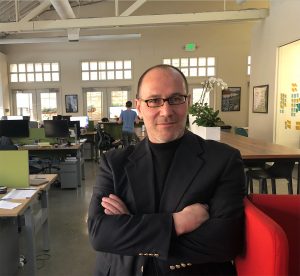
The rapidly evolving field of digital phenotyping involves uncovering specific health-related information in the moment-to-moment data created when people use their smartphones. A recent $200,000 gift from Mindstrong Health is supporting the research of Jukka-Pekka (JP) Onnela, a Harvard Chan associate professor of biostatistics who is developing new statistical and computational methods for analyzing this smartphone-generated data.
Human behavior is context-specific, notes Onnela, which is why characterizing life in everyday surroundings, outside of research labs, is critical. Digital phenotyping can gather 1 billion data points per subject per month—passively, objectively, and continuously. Paul Dagum, founder and chief executive officer of Mindstrong Health, believes that progress in improving outcomes for people with neurodevelopmental and neurodegenerative disorders depends on having better data through rigorous, real-world measurement. “Digital phenotyping can measure detailed information about a person’s mood, cognition, and behavior,” he says. “We can capture a lot of data that, as humans, we’re not really equipped to process.” Indeed, digital phenotyping has the potential to help patients with mental or brain disorders—such as schizophrenia, perinatal depression, post-traumatic stress, and dementia—detect changes in their conditions days before clinical symptoms emerge.
“We’re very excited to be funding JP’s work,” says Dagum. “His research is helping the field grow—and we need people like JP to fully develop and understand the potential of digital phenotyping. Our vision is to make this successful at a global scale.”
Dagum notes that 3 billion people in the world have smartphones—a number that will grow to 6 billion by 2020. “The information from smartphones can be used at the individual level to help people manage chronic conditions, even beyond mental health,” he says. “And it can be used at an aggregate level for public health. Imagine having a heat map of the planet that can show hot spots of, say, emotional volatility or cognitive decline from stress, contagion, or toxins. The potential’s big.”
Most of Onnela’s research so far has been supported by the unrestricted funding of his 2013 NIH Director’s New Innovator Award. “That award gave us the flexibility to do something that many people thought was not possible,” he says. “Initially, our goal was to conduct just one study and develop a couple of methods. Now, we’re involved in some 20 different studies.” The Mindstrong gift also provides flexible funding, which is especially important in an innovative area of study.
“We’re extremely grateful for this gift,” says Onnela. “It boosts our ability to develop methods to make sense of massive amounts of data. This gift enables us to be nimble and tackle problems as they arise. That’s very important for us being able to make efficient progress on our research, and it will mean that we can have greater translational impact with our work. If we can measure social and behavioral markers in people’s environments, I think it’s going to be huge, especially for psychiatric and neurological conditions. I’m biased, but I really think that it will transform the field.”
Jan Reiss is assistant director of development communications and marketing at the Harvard Chan School
Photo: Courtesy of Mindstrong Health
10.12.18: This story reflects an updated gift amount.







